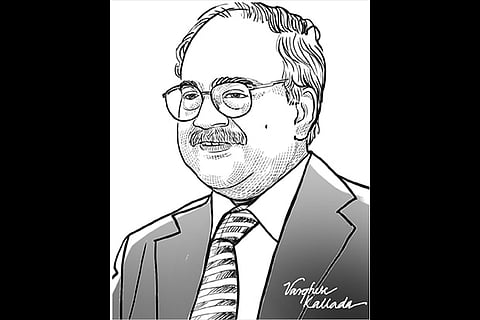

Chennai
In these four decades, Dr TS Surendran has serviced over one lakh patients and performed 20,000plus surgeries, mostly on squint. His surgical precision and skill-sets in paediatric ophthalmology has won him several laurels. But the one he cherishes most is the Lifetime Achievement award from The Strabismus and Peadiatric and Ophthalmology Society of India, of which he is one of the founding members. He also talks with pride about the Edinburgh fellowship degree conferred on him.
Calling Dr Surendran a medical professional will not do justice to his immense contribution in the vision arena. He has transcended the boundaries of the profession enough to be recognised as a leader par excellence. Celebrities or citizens without any exalted status – he continues to provide the same care that he has persisted with in his chosen field with passion that is hard to come by. He is the only member from the original core team (created to participate in the vision of his renowned mentor Dr SS Badrinath, who established the non-profit eye hospital under the aegis of Medical Research Foundation (MRF) in 1978) to stay on course with Sankara Nethralaya (SN) even now.
“My mentor, while serving VHS – Voluntary Health Services, had in 1974 introduced the concept of half-day practice and half-day service. Many renowned industrialists joined forces and helped him nurture the Kanchi seer-inspired dream of his to build the MRF. With a Parsi childless couple giving their property and the then MGR government support, the edifice of the dream started taking shape,” says Dr Surendran, who went back in time to share the roots of a grand vision of providing affordable quality eye-care.
With Dr Badrinath spelling out his vision of bringing multi-specialties in the field of eye-care, the days of serving basic needs such as corrective refractory errors (spectacles) and routine cataracts were over. “The dream of creating a gigantic institution made us embark on multi-specialties and sub-specialties too. We opened up retina centre for cataracts, cornea, oculoplasty (abnormalities in the structure of the eye) and UVEA (vascular middle layer of the eye) department,” says Dr Surendran, who is content to play the second leader’s role ever since he joined the institution.
Emphasising on the mission to provide affordable eye-care using the latest teaching, training and research-based methodologies and latest technology advancements, he highlighted SN’s ability to have teams that instilled confidence by functioning as a family-unit to service the needs of all stakeholders. “The institutional background, team approach, availability of good human resource backup, excellent lab facilities and being on the same wavelength of his mentor are the factors that have built SN,” says Dr Surendran, who has treated VIPs including former President R Venkatraman, former CM MGR and former union minister Bhuta Singh. In fact, the originator of mono-vision was MGR, he said. It was a suggestion by him that made them order contact lens — one eye for distant vision and the other eye for near vision. “MGR kannadi podamal Assemblyil padithar (MGR read without glasses in Assembly) screamed a newspaper headline,” recalls the doctor, who has seen around 10 films, including Vidhuth alai in the now-defunct Mena theatre with Superstar Rajinikanth. Incidentally, Dr Surendran’s patients’ list include many chief secretaries (TN’s latest Chief Secretary Girija Vaidyanathan too) and cine stars such as Rajinikanth, Sridevi, Gautami and Mansoor Ali Khan.
“Full leadership has never been my cup of tea,” says Dr Surendran, who, asked about the key leadership attributes, responds by saying, “the ability to dream more, to stay committed, serve society and the ability to lead with integrity, transparency and dedication are what make great leaders.”
Another thing that he talks about is the need for individuals to gain overseas exposure. “I was a slow surgeon but training at Washington gave me techniques that increased my speed four-fold. While I gained confidence in enhancing my surgical skills, such opportunities improve communication skills too,” he said.
Visit news.dtnext.in to explore our interactive epaper!
Download the DT Next app for more exciting features!
Click here for iOS
Click here for Android